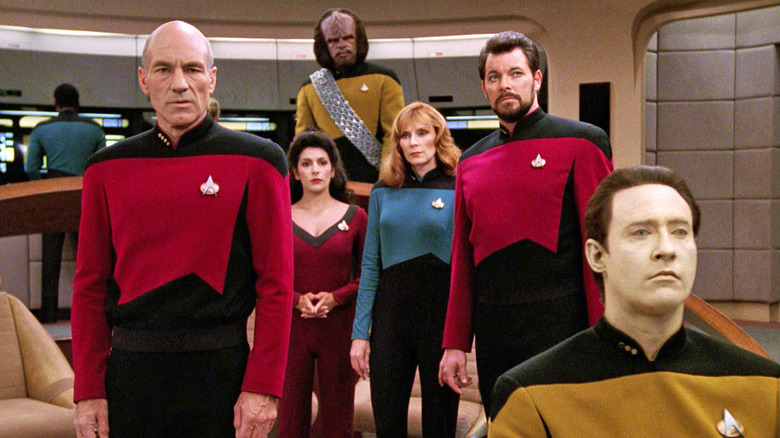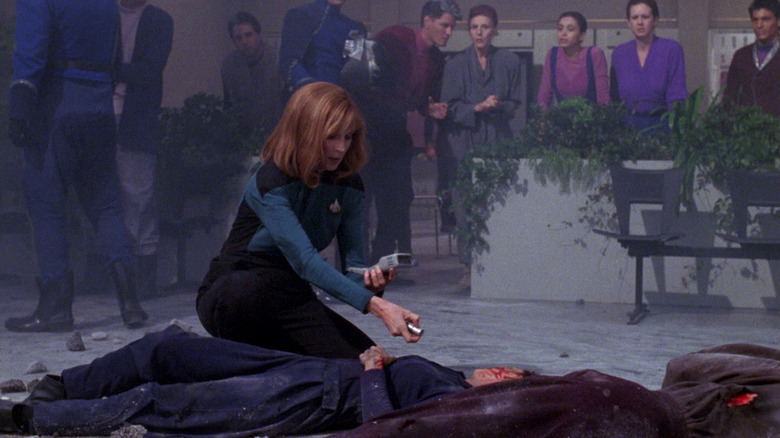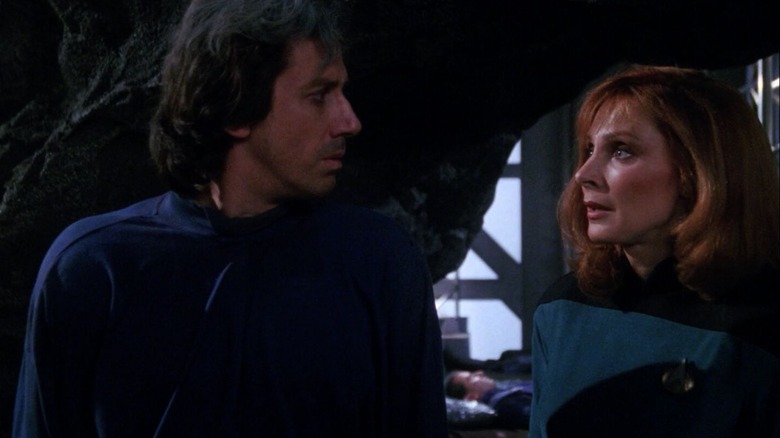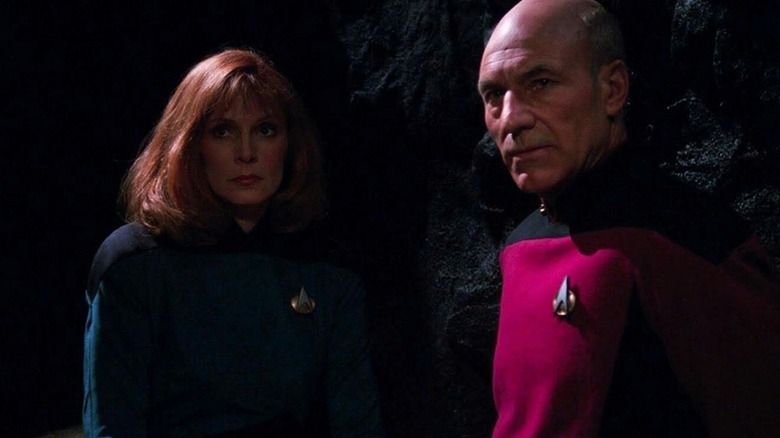Star Trek: The Next Generation's Most Controversial Episode Explained

"Star Trek" has never been one to shy away from politics. When the show wasn't dealing directly with the various political machinations of its various alien worlds and bureaucratic bodies, it was couching its often-progressive ideas in sci-fi metaphors. Sometimes the metaphors played incredibly well ("Star Trek VI: The Undiscovered Country" was a clever sci-fi version of the end of the Cold War with the Klingons standing in for Russia), while at other times they were blunt to the point of being risible (the bifurcated aliens in "Let That Be Your Last Battlefield" are pretty silly).
"Star Trek: The Next Generation," which debuted in 1987, was what happened when show creator Gene Roddenberry began to practice what he preached. In the 1970s, Roddenberry began going to go on speaking tours about "Star Trek" (canceled after three seasons), and had discourse with fans about the show's more progressive elements, most notably how the future was depicted as being bright, humanity was at peace, anti-Colonialism was the word of the day, and technology was there to help us, not scare us. Roddenberry also took to heart the notion that "Star Trek" was an excellent pop vessel for exploring contemporary political themes, but comfortably shrouded in aliens and starships, obfuscated from any potential censure.
As such, "Next Generation" often became very deliberately political, confronting modern-day Earth politics without fear of being censored.
But they were censored.
The High Ground

One January 20, 1990, "The High Ground," a third season episode of "Star Trek: The Next Generation," first aired in the United States. In it, The Enterprise is summoned to help the victims of a terrorist bombing on the non-Federation world of Rutia IV. While aiding a victim, Dr. Beverly Crusher (Gates McFadden) is kidnapped by a terrorist named Kyril Finn (Richard Cox). Finn has been fighting for the independence of his people, the Ansata, but has been using a new kind of long-distance transporter that aids in eluding capture, but has been slowly deteriorating the bodies of those who use it. Dr. Crusher is asked to cure the people harmed by the transporter. Later in the episode, Finn will also break onto the Enterprise and also kidnap Captain Picard (Patrick Stewart).
The episode ends with Finn being apprehended by the local authorities in the form of a cop named Devos (Kerrie Keane), who returns Dr. Crusher and Picard, but who swears to put Finn to death. Since the Enterprise has no jurisdiction on this planet, they have to reluctantly fly away in the knowledge that the cycle of violence and terrorism will continue on this planet.
"The High Ground" is not often listed on rundowns of the best episodes of "Star Trek: The Next Generation," but it's decent.
The Irish Unification Of 2024

While "The High Ground" may be seen as a general commentary on the cycles of violence cause by terrorism and stubborn governments, it's easy to see the more direct metaphor for unrest in Northern Ireland. The show's writer, Melinda M. Snodgrass, originally conceived the episode to be a metaphor for the American Revolution, but it was the show's producers who elected to change "The High Ground" into something more contemporary, adding in a debate as to the ethics and effectiveness of terrorism. This final notion was what got "The High Ground" into some hot water in the UK.
There is a scene partway through "The High Ground" wherein Data (Brent Spiner), in his android-like way, talks to Picard about how the Enterprise is meant to reject terrorism ("My programming would define their behavior as unnecessary and unacceptable"), but also that it can be a most effective tool in forming an independent nation and breaking free of an oppressive government. Data asks Picard why, if terrorism is so unnecessary, is it so often successful? He cites a few (fictional, future) historical examples of when terrorism did work, including "The Irish Unification of 2024."
This is a reference to what the media called The Troubles, which stems from the 1920 Government of Ireland Act, which divided Ireland and Northern Ireland into two separate entities. It sparked of a generations-long bout of sectarian violence that was very much still in the news in 1990. There is far too much to get into here, but those of us watching "Star Trek" in the United States in 1990 were likely getting a lot of headlines about the violent conflict between Ireland and Northern Ireland. For a more personal view of the time, one can watch Kenneth Branagh's new film "Belfast."
This scene was not allowed on UK TV in 1990, and remained banned until 2007.
Brexit

"The High Ground" was allowed back on UK TV in 2007 after the show's sentiment had effectively cooled, although Data's speech about the effectiveness of terrorism remains omitted in Irish broadcasts of the episode (as confirmed in The Irish Post).
But that wasn't the end of discussion about "The High Ground."
The future date of Irish Unification was listed as 2024, it started to seem awfully close to those looking at the dynamics of Brexit in 2021. England is currently going through a sea change as it pulls itself away from the European Union, leaving much of the future of Ireland, Northern Ireland, and Scotland in flux. From Reuters: "Northern Ireland will remain aligned to the EU's single market and goods arriving in Northern Ireland will be subject to EU customs rules."
Given the economic and violent tensions in Ireland, the government isn't too ready to accept a TV episode that states, out loud, that terrorist violence will lead to a satisfying outcome in the year 2024. In this instance, Trek's reputation for hiding modern politics beneath a cloak didn't quite work.
Read this next: Star Trek: The Next Generation's 10 Best Episodes
The post Star Trek: The Next Generation's Most Controversial Episode Explained appeared first on /Film.
from /Film https://ift.tt/3IHi7FF
No comments: